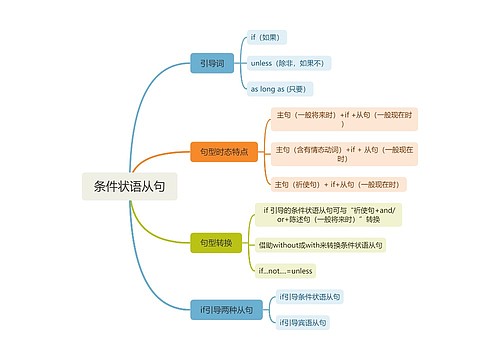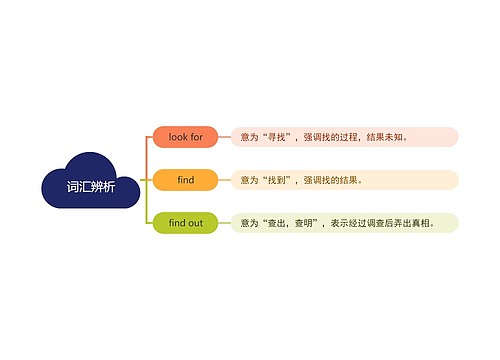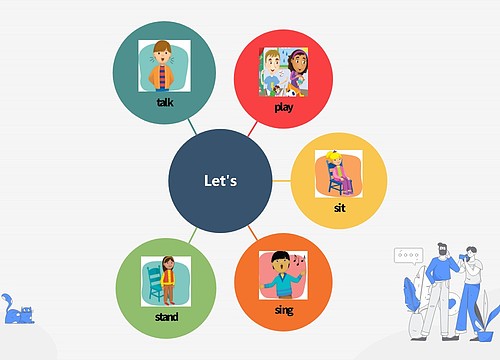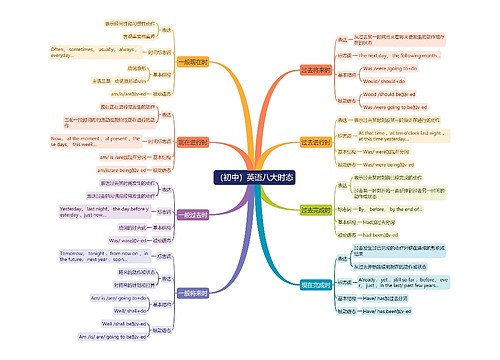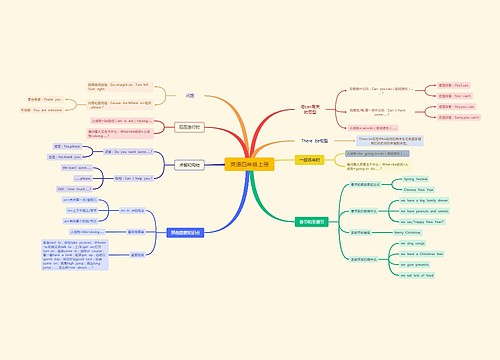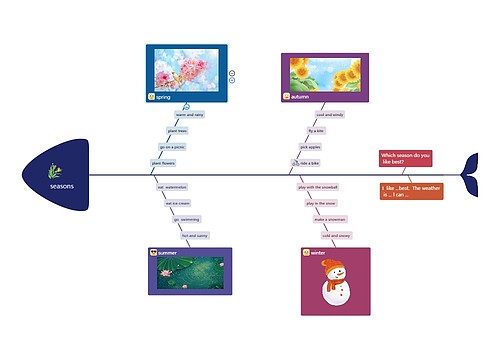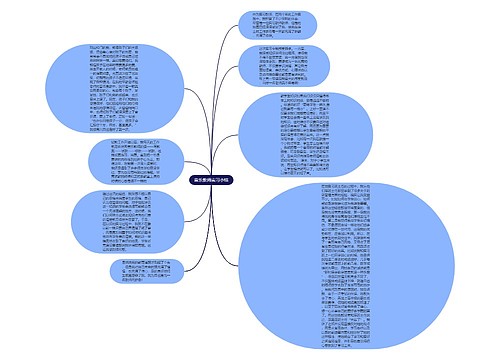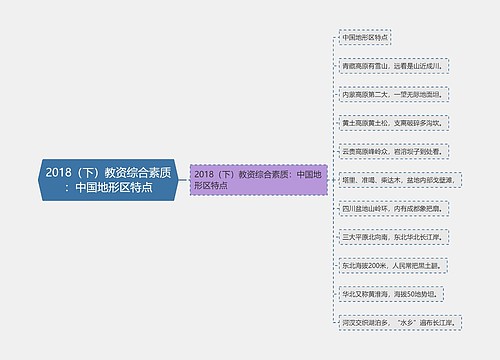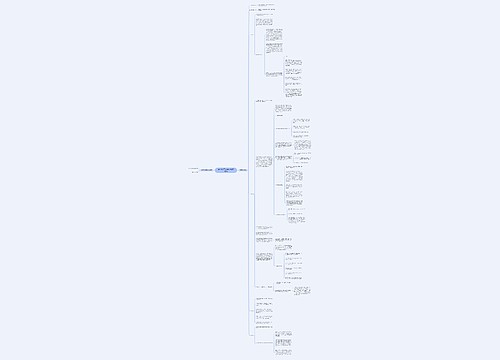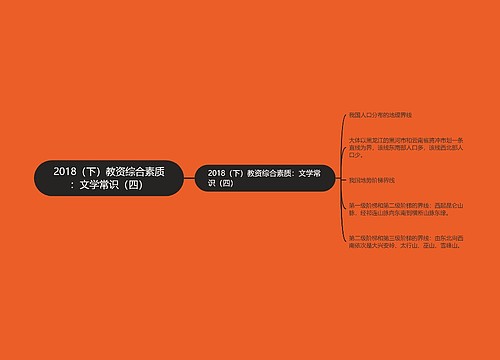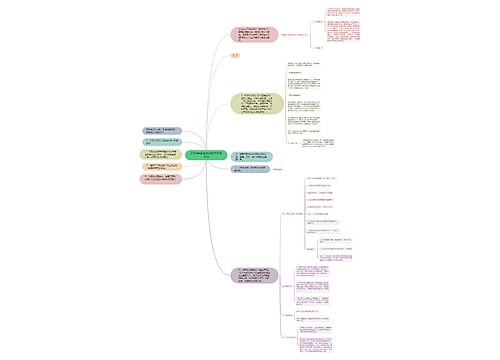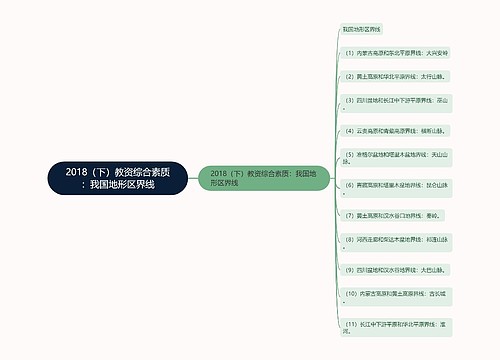
句子成分的用法归纳总结附视频思维导图
从前多好
2023-03-14

资料
初中英语语法
句子成分的用法归纳总结附视频
树图思维导图提供《句子成分的用法归纳总结附视频》在线思维导图免费制作,点击“编辑”按钮,可对《句子成分的用法归纳总结附视频》进行在线思维导图编辑,本思维导图属于思维导图模板主题,文件编号是:b9de096ecbfdca4171359bcba070e7a6
思维导图大纲
相关思维导图模版
句子成分的用法归纳总结附视频思维导图模板大纲
句子成分的用法
1、主语
(1)由名词、代词(人称代词用主格)、动词不定式、动名词等充当,说明动作是“谁”发出的。如:The painter painted a very nice picture. (画家画了一幅漂亮的画。) / They fought against SARS bravely. (他们勇敢地与非典搏斗。) / To see is to believe. (耳听为虚眼见为实). / Helping animals is to help people. (帮助动物就是帮助人类。)
(2)动词不定式或动名词做主语时可用it代替,而不定式或动名词移至表语或宾语之后。如:It is very comfortable to have a Class A seat during the long journey. (在长途旅行中能有个甲等座位简直太舒服了。) / Eating too much is bad for your health.(=It is bad for your health eating too much.) (吃得太多对你的身体不利。)
(3)口语中常见主语或“主--系”省略:(It is) nothing. ((那)没有什么。)/ (It) doesn’t matter. ((那)没有关系。) / (I) thank you. ((我)谢谢你。)
(4)反意问句的附加问句,主语必须是代词:The man looks worried,doesn’t he? (这个人看上去很着急不是吗?) / Tigers are dangerous animals, aren’t they? (老虎是危险的动物不是吗?)
(5)祈使句一般省略主语。加主语时往往用来指定某个人。Keep the keyboards clean, children. (孩子们请保持键盘的清洁。) (省略了主语) / You go there and fetch me a glass of water. (你去给我弄一杯水来。)
(6)主语一般在句首,但在问句中会处于第二位和句尾;倒装句及there be句型主语在动词之后。如:Computers are made in this factory. (计算机生产于这家工厂。) / Where are they? (他们在哪儿?) / Does the boy like staying home? (这个男孩喜欢呆在家里吗?)
(7)主语与谓语必须保持单、复数的一致, 而谓语与表语或宾语之间没有这一要求。Neither Jim nor Rose has passed the exam. (Jim和Rose都没有通过考试。) / The Chinese people are a hardworking and brave people. (中华民族是一个勤劳勇敢的民族。)
(8)主语可以由从句充当,详见“主语从句”。
2、谓语
(1)由“不及物动词”、“及物动词+宾语”或“系动词+表语”等构成,说明主语所表示的人物“干什么”或“怎么样”。如:
He travelled in space for the first time.(他首次在太空旅行。) / Who teaches you English this year?(今年谁教你们的英语?) / The pizza has gone bad. (那块烤馅饼已经变坏。) /
(2)谓语动词必须反映出人称、单复数、时态等信息,谓语动词往往由下列词语依序排列构成:[情态动词]+[时态助动词]+[语态助动词]+[主要动词](不一定全部出现)。(见动词的时态和语态构成表)记住:谓语部分第一个动词往往是变形动词。如:
I am sorry I am making so much noise but I have to. (对不起我发出了太大的声音但是只能这样。) / He can’thave finished reading the 800-page-long novel. (他不可能读完了那本长达800页的小说。) / Something must be done to stop the fowl flu from spreading out. (该采取措施防止
禽流感蔓延。)
(3)谓语动词切忌用“行为动词1 + 原形动词”、“be + 原形动词”。
记住使用下列正确形式:
①情态动词+原形动词。如:You’d better go over the lesson.(你最好复习这一课。)
②shall/ will/ would+原形动词。如:They should have been there once.(他们应该去过那儿。)
③be+现在分词或者过去分词。如:What are you doing this evening?(今晚你打算做什么?)/ Many trees have been cut down since 1970s.(自从20世纪70年代大批树木被砍伐。)
④have+过去分词。如:Many trees have been cut down since 1970s.(意思同上)
⑤一般时问句和否定句中:do/does/did+原形动词。如:He does not enjoy himself very much.(他日子过的不好。)/ Did any of you see dinosaur eggs?(你们当中有谁见过恐龙蛋吗?)
⑥行为动词1+行为动词2 (不定式、动名词、现在分词、过去分词等形式)。如:He made up his mind to be a vet.(他拿定主意要做个兽医。)/ Feeling good about yourself is essential to feeling good about life.(自尊自爱是享受生活的根本。)/ They wake up the other family members, calling,“Merry Christmas!”(他们叫醒家庭的其他成员,呼喊着:圣诞快乐!)/ The kings of ancient Egypt had strong tombs built for themselves.(古代的埃及国王让人给他们自己修建坚固的坟墓。)
(4)不可用形容词、名词、代词、副词、介词短语等独立作谓语,必须在此之前加连系动词。
(5)谓语动词单复数形式:单数形式的动词有:is,was,has,does以及“动词+s”;复数形式的动词有:are,were,have以及动词原形。其他动词不分单、复数。
记住:主语、谓语单复数必须保持一致。(参见“4、名词或代词作主语时和谓语之间的单复数的一致问题:”) Air and water is necessary to us all.(空气和水对于我们大家是必不可少的。)
(6)一般问句和反意问句的回答不使用行为动词,应该使用“是”动词、情态动词、助动词(be,will,have,do以及变形)。如:The Olympic Games is held every other year, isn’t it? ----Yes, it is.(奥运会每两年举办一次,是吗?----是的。)
3、宾语
(1) 由名词、代词(人称代词要用宾格)、不定式、动名词、(宾语)从句充当,表示动作的承受者是“谁”或者是“何物”。如: The angel also came to Joseph and told him the same thing.(那个天使同样来到约瑟夫面前并且告诉他同样的事情。)(代词和名词充当两个宾语) / He told me that the company could not afford to pay him so much money.(他告诉我说公司付不起他那么多的钱。)(不定式作宾语) / They enjoy watching football games so much that they often forget their lessons.(他们如此喜爱看足球以至于常常忘记了他们的功课。)(动名词作宾语) / I think to be a children’s doctor is very rewarding.(我认为当个儿童医生是很值得的。)(从句作宾语)
(2) 只有及物动词或介词才有宾语,不及物动词没有宾语,如果涉及到事物,则必须在不及物动词后面加合适的介词。Listen to the radio. (listen不是及物动词,故加to。) / Can you hear anything exciting?(你能听到什么令人兴奋的消息吗?)
(3) 宾语一般放在及物动词或介词的后面,但是在疑问句中,如果宾语是疑问词,则宾语要放在句首。介词的宾语如果是疑问词,则可以放在介词后或句首。如:What did he see? (他看见了什么?) / What does he write a letter with? (他用什么写的信?) / With what does he write a letter? (他用什么写的信?)
(4)“动词+副词+宾语”结构中,如果宾语是代词,则代词必须放在“动”“副”之间。如:Please put the shoes away. (请把鞋子收起来。) / Please put away the shoes. (请把鞋子收起来。) / Please put them away. (请把它们收起来。)
(5) 动词后面跟双宾语时可以采用两种结构:
①动词+间接宾语(人)+直接宾语(物)。如:He often gives me some help. (他常常帮我。)
②动词+直接宾语+介词+间接宾语。注意,一般情况介词用to,但动词是make, buy, borrow时,介词用for.如: Please make me a kite. (请给我做个风筝。)或Please make a kite for me.
(6) 在“动词+宾语+宾补”结构中,如果宾语是不定式、动名词、宾语从句,则常用it做形式宾语,而将实际的宾语移到补语后面去。如:I found the job rather difficult. (我发觉这个工作相当难做。) / I found it rather difficult to do the job.
(7) 宾语可以由从句充当,详见“宾语从句”。
4、表语
(1) 说明主语的身份、性质、状况等含义的成分,通常由形容词、副词、介词短语、名词、代词等充当。如:He became a doctor after he left high school.(高中毕业他当上了医生。) / The rubber wheels are over there.(橡胶轮子在那边。) / He does not feel like eating anything today because he has caught a bad cold.(他今天不想吃任何东西因为他得了重感冒。) / Who is it?(谁呀?)
(2) 表语只能放在连系动词(如:be,look,become,turn get,grow,feel,seem) 之后,对表语进行提问的句子除外。
(3) 代词做表语一般用主格,口语中常用宾。如:It’s I. (It’s me.)是我。
(4) 只能作表语的形容词有:sorry,afraid,alone,asleep,awake,ill,well,sure,interested等等。He was terribly sorry for his carelessness.(他很为他的粗心而歉疚。) / Please make no noise here; the baby is asleep.(请不要发出响动,婴儿正熟睡呢。) / I am only interested in sitting in a boat and doing nothing at all!(我只是对独坐孤舟无所事事感兴趣。) / I am not alone in thinking so.(并非只有我才这样想的。)
(5) 表语也可以由从句充当,详见“表语从句”。
5、定语
(1) 修饰名词或代词的成分,常由形容词、名词(含所有格)、代词(物主、指示、疑问、不定)、介词短语、不定式(短语)充当,在初三阶段还学习了定语从句做定语的知识。如:Put it in the top drawer.(把它放在最上层的抽屉里。) / France and Switzerland are European countries. (法国和瑞士是欧洲国家。) / His mother and father are both college teachers.(他的父母都是大学教师。) / This is the day that I can never forget in my life.(这是我一辈子难忘的日子。)
(2) 单词做定语时一般放在被修饰的名词前面,而且有一定的次序:
(3) 时间副词(now,then,today,yesterday,...)、地点副词(here,there,back,in,out,home,...作定语时放在被修饰的名词后面。如:I could not find my way out, so I stayed there all along. (我找不到出去的路,所以就一直呆在那儿。)
(4) 介词短语修饰名词时只能放在名词的后面:The monkey in the cage was caught yesterday. (笼子里的猴子是昨天逮着的。)
(5) 形容词修饰复合不定代词时,往往后置。如:He remembered everything unusual. (他记得所有不寻常的事情。)
(6) 定语还可以用从句充当,详见 定语从句。
(7) 注意:由于定语属于修饰性的成分,因此它常归入主语、宾语、表语之中,不作为句子的主要成分。
6、状语
(1) 说明动作“何时”、“何地”、“如何”发生,或者说明形容词或副词的程度,一般由副词、介词短语、不定式、状语从句等充当。如:I was not born yesterday.(我又不是昨天才出世的娃娃。)/ For many of these families a college education was something new.(对其中的许多家庭来说,大学教育是件新事物。)/ He woke up to find his house on fire.(他醒来发现房子着火了。) / You cannot leave until your work is finished.(在你的工作被完成以前你不能离开)
(2) 副词作状语位置较为灵活,详见《六·2》“副词在句子中的位置以及作用”;介词短语作状语,位置基本固定,详见《七·4》“介词短语在句子中的位置”;不定式作状语,一般表示目的、结果,详见《八·7》“动词的非谓语形式”;从句作状语,详见《主从复合句》的“状语从句”。
(3) 多个状语相连时,一般先单词、后短语,先地点、后时间,先小概念、后大概念。如:He went ouf of the room at a quarter to 23:00 last night and then disappeared into the dark.(他昨夜22点3刻从房间里出来,然后消失在黑暗之中。) /
(4) 状语还可以用从句来充当,有时间状语从句、地点状语从句、原因状语从句、目的状语从句、结果状语从句、比较状语从句、让步状语从句、条件状语从句等。详见“状语从句”。
(5) 注意:由于状语属于修饰性的成分,常归入谓语,因此不作为句子的主要成分。
7、宾语补足语
(1) 补充说明宾语的动作、状态的成分为宾语补足语,常由名词、形容词、动词非谓语形式(不定式、现在分词、过去分词等)、介词短语等充当。如:Call him Jim, please. (请叫他Jim。) / I tried my best to make him happy. (我竭尽所能让他开心。) / Ask her to come to dinner tomorrow. (请他明天来。) / He let the smaller animals bring food to him. (他让小动物们给他带食物来。)
(2) 部分表示位置、方向的副词也可以作宾语补足语。如:Let him in, I tell you! (我跟你说,让他进来!)/ Please put it away. (请把它收起来。)
(3) 不定式或分词作宾语补足语的情况,详见《八·7》“动词的非谓语形式”相关内容。
句子成分的用法讲解视频
句子成分的用法的其他视频
精通英语句子成分
查看更多
904名中国成年人第三磨牙相关知识、态度、行为和病史的横断面调查思维导图
 U633687664
U633687664树图思维导图提供《904名中国成年人第三磨牙相关知识、态度、行为和病史的横断面调查》在线思维导图免费制作,点击“编辑”按钮,可对《904名中国成年人第三磨牙相关知识、态度、行为和病史的横断面调查》进行在线思维导图编辑,本思维导图属于思维导图模板主题,文件编号是:10b9a8a2dd2fb4593f8130ef16c320fc

9.战斗的基督教思维导图
 U582679646
U582679646树图思维导图提供《9.战斗的基督教》在线思维导图免费制作,点击“编辑”按钮,可对《9.战斗的基督教》进行在线思维导图编辑,本思维导图属于思维导图模板主题,文件编号是:33d168acd0cd9f767f809c7a5df86e3a
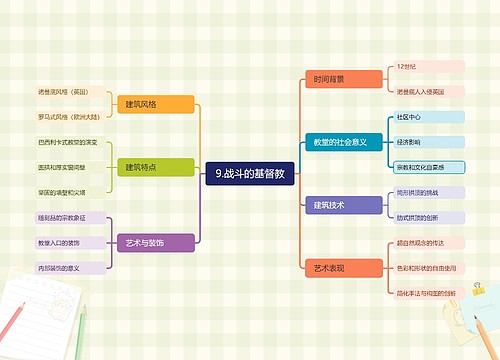
相似思维导图模版
首页
我的文件
我的团队
个人中心
